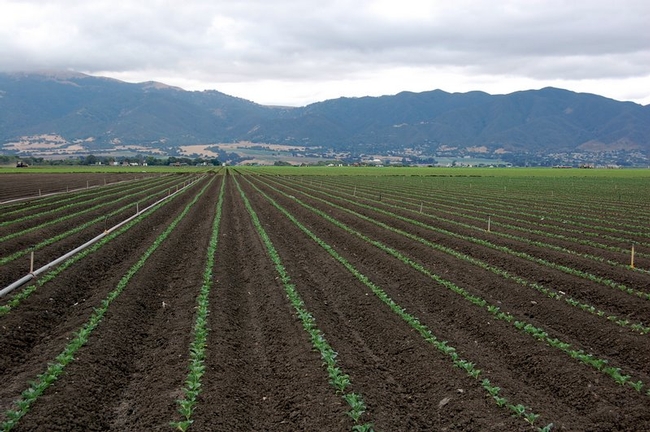
Posts Tagged: plant breeding
UC Davis launches African Plant Breeding Academy

“We are honored to be part of this new venture,” said UC Davis plant scientist Allen Van Deynze, co-founder of the UC Davis Plant Breeding Academy, which has trained 114 crop breeders from 26 countries since 2006.
“We believe that the new plant breeding academy will produce important benefits for the daily lives of many Africans,” said Van Deynze, who is also the research director for the University of California Seed Biotechnology Center.
The new academy is part of the African Orphan Crops Consortium, which aims to sequence the genomes of 96 indigenous orphan crops that are important for African diets. The term “orphan crops” refers to African food crops and tree species that have been neglected by researchers because they are not economically important on the global market. The 96 crops being sequenced by the consortium include African eggplant and potato, cocoyam and Ethiopian mustard, as well as more commonly known crops such as cassava, cacao, millet, sorghum and legumes.
The African Plant Breeding Academy will enable plant breeders to enhance the nutritional value of these key crops through breeding and application of genomic tools.
Partners in the consortium are the African Union’s New Partnership for Africa’s Development, Beijing Genomics Institute, Life Technologies, World Wildlife Fund, University of California Seed Biotechnology Center, iPlant, Integrated Breeding Platform Initiative and Mars Incorporated. More information on the consortium is available online.
"Getting opportunities to grow nutritious food and put it into the hands of those who need it most has been the ambition of the African Orphan Crops Consortium since its inception,” said Howard Yana-Shapiro, chief agricultural officer for Mars Inc. and a senior fellow in the UC Davis Department of Plant Sciences.
"It is hugely exciting to realize that, through the pursuit of fundamental science, the consortium is playing its role in fighting chronic hunger and malnutrition, and Mars is proud to be a part of this effort,” he said.
The new academy, a six-week program, will be delivered in three two-week classes, beginning Dec. 2 at the World Agroforestry Center in Nairobi. Closing date for applications is July 15.
Participating African plant breeders will be trained in the most advanced theory and technologies for plant breeding, in support of critical decisions for crop improvement. The curriculum will cover the latest concepts in plant breeding, quantitative genetics, statistics and experimental design.
The program also covers accurate and precise trait evaluations, strategies to integrate genomics into breeding programs, and identification and use of genomic data and DNA-based markers in breeding programs.
The instructors are internationally recognized experts in plant breeding and seed technology.
With significant contributions from Life Technologies and the World Agroforestry Center in Nairobi, the African Orphan Crop Consortium is developing state-of-the art laboratories to apply the technologies being developed for Africa.
The African Plant Breeding Academy is the latest offering of the UC Davis Plant Breeding Academy, a premium professional certificate program, offered since 2006 in the United States, Europe and Asia.
For more information on the African Plant Breeding Academy’s course curriculum, dates, application process and scholarships, please visit http://pba.ucdavis.edu/ or http://www.nepad.org.
About the New Partnership for Africa’s Development
The partnership is a program of the African Union, with the mandate to eradicate poverty through sustainable growth and development. The key priority areas of the agency include, among others: facilitating implementation of the food security and agricultural development program in all sub-regions; and monitoring and intervening as appropriate to ensure that the Millennium Development Goals in the areas of agriculture/food nutrition, health and education are met.
About UC Davis
In May, UC Davis was ranked No. 1 in the world for teaching and research in agriculture and forestry by QS World University Rankings. For more than 100 years, UC Davis has engaged in teaching, research and public service that matter to California and transform the world. Located close to the state capital, UC Davis has more than 33,000 students, more than 2,500 faculty and more than 21,000 staff, an annual research budget of nearly $750 million, a comprehensive health system and 13 specialized research centers. The university offers interdisciplinary graduate study and more than 100 undergraduate majors in four colleges — Agricultural and Environmental Sciences, Biological Sciences, Engineering, and Letters and Science. It also houses six professional schools — Education, Law, Management, Medicine, Veterinary Medicine and the Betty Irene Moore School of Nursing.
Media contact(s):
- Allen Van Deynze, UC Davis Plant Breeding Academy, (530) 754-6444, avandeynze@ucdavis.edu
- Pat Bailey, UC Davis News Service, (530) 752-9843, pjbailey@ucdavis.edu
UC Davis plant breeding: nurturing a rare breed
While working in Tanzania on community development projects several years ago, Iago Lowe came to a life-changing conclusion:
Food security is central to projects that make a lasting difference in people's well-being. It ensures that communities have the seeds, soil, water and environment to produce enough to eat.
However, his bachelor's degree in physics and religion from Dartmouth College did not adequately prepare him to spearhead those kinds of projects.

To address that gap in his ability to "make some small difference in the world," Lowe started doctoral studies at UC Davis in 2007 in plant breeding and genetics.
"There are so many needs in developing nations — for schools, roads, water, other infrastructure — but when the money and people leave, so often the projects die," said Lowe, who completed his Ph.D. in Plant Breeding and Genetics at UC Davis in 2011. "The few projects I saw that continued to thrive, that really made a tangible difference in people's lives, almost always dealt with local food security, seed systems, soil and water conservation and ecological restoration — projects that demanded a set of skills I didn't have. After studying plant breeding at UC Davis and that's no longer the case."
Lowe exemplifies a new breed of plant breeders at UC Davis. Long a global leader in plant breeding, UC Davis has been retooling its programs — offering new training, creating new curriculum, hiring new faculty (as the budget allows) and conducting world-class research to meet a growing demand for new crops and for breeders.
The new generation of scientists that those programs will produce — and their research breakthroughs — can't come soon enough for industry, government and philanthropic foundation leaders who say that a shortage of plant breeders is hampering efforts to alleviate hunger around the world. Hundreds of high-paying industry jobs for plant breeders are going unfilled.
“Plant breeding is such a vital tool for helping us deal with significant challenges in the 21st century such as food security, population increase, urbanization, and water and energy shortages," said Xingping Zhang, a watermelon breeder with the Davis-based seed company Syngenta. "Who is going to educate the plant breeders? UC Davis is in a perfect position to do so because it's a great center of science and technological inventions, located right in the heart of agricultural abundance. No place in the world offers the diversity of crops [like those] grown in California."

In another major nod to UC Davis expertise, the U.S. Department of Agriculture awarded $40 million in grants earlier in 2011 to develop climate-change-tolerant plants and new bioenergy sources. UC Davis scientists will lead two research teams from more than 50 universities in more than 20 states.
"Each of these projects features transdisciplinary, regional, integrated teams, including scientists from institutions that represent underserved populations," said Roger Beachy, director of the USDA's National Institute of Food and Agriculture, in announcing the grants at UC Davis. "This approach represents a new paradigm in how USDA science can best solve critical issues facing agriculture today."
You can read more about the history and future of plant breeding at UC Davis in this article in the UC Davis Magazine.
Learn more:
UC Davis plant breeding education
Story on UC Davis Department of Plant Sciences website
Seed Biotechnology Center videos on plant breeding
UC Davis research discovery a game changer
A UC Davis plant scientist has discovered a reliable way to produce plants that carry genetic material from only one parent, a breakthrough that could speed up crop plant breeding programs, according to a letter published today in the online journal Nature.
Assistant professor of plant biology, Simon Chan, said the chance discovery was at first thought to be a mistake.
"We were doing completely 'blue skies' research, and we discovered something that is immediately useful," Chan was quoted in the UC Davis news release about the research.
The research was conducted at the molecular level on Arabidopsis thaliana, a flowering spring annual with a short life cycle. Arabidopsis is a popular model organism in plant biology and genetics because its genome is relatively small and was the first plant genome to be sequenced.
Chan's discovery is helpful because plant breeders want to produce plants that carry the same trait on both chromosomes, ensuring they will pass on favorable traits when bred. To do this, the release said, plants must be inbred for several generation to make the plant "breed true."
The research revealed an alternative, less time-consuming process for developing "breed true" plants.

Research photos published in Nature.
